Este blogue é destinado aos estudantes, professores e os interessados em aprender um pouco de Língua Estrangeira Moderna, o Inglês.
Translate
domingo, 3 de novembro de 2013
terça-feira, 15 de outubro de 2013
Adverbs of manner
Classificação dos Advérbios:
1) Advérbios de modo - Adverbs of manner :
São aqueles que nos dizem como algo aconteceu, acontece, acontecerá etc. Exemplos:
well (bem) fast (rápido) badly (mal)
just (somente, exatamente = adv. modo / recentemente, há pouco = adv. tempo)
stupdly (estupidamente) brilliantly (brilhantemente) loudly (em voz alta)
gracefully (graciosamente) cleverly (habilmente, com inteligência)
quietly (com quietude, calmamente) vigorously (vigorosamente)
eagerly (ansiosamente, avidamente) skillfully (habilmente, com destreza)
easily (facilmente) slowly (vagarosamente) wildly (de forma selvagem, desordenadamente)
leisurely (sem pressa) lively (energicamente) happily (felizmente, alegremente)
|
- Os advérbios de modo são bastante flexíveis e, normalmente, podem aparecer nas três posições
anteriormente apresentadas:
anteriormente apresentadas:
a) Antes do sujeito:
Quickly he organized the entire thing. (Rapidamente ele organizou a coisa toda.)

b) Entre o sujeito e o verbo:
He quickly organized the entire thing. (Ele, rapidamente, organizou a coisa toda.)
He quickly organized the entire thing. (Ele, rapidamente, organizou a coisa toda.)

c) Após o verbo ou o objeto:
He organized the entire thing quickly. (Ele organizou a coisa toda rapidamente. )

Observação: o advérbio de modo just é colocado após o verbo TO BE:
That's just what I'm looking for. (Isso é exatamente o que eu estou procurando.)
It's just as I thought. (É exatamente como eu pensava.)
That's just what I'm looking for. (Isso é exatamente o que eu estou procurando.)
It's just as I thought. (É exatamente como eu pensava.)
Adverbial phrases of manner
Como ficaria em inglês algumas locuções adverbiais de modo do português? Confira a seguir:
a custo - with difficulty
às pressas - fast
à toa - occasionally
à vontade - at will, freely
às avessas - just the opposite
às claras - openly, directly
às direitas - straightforward
ao acaso - without consideration
ao contrário - in contrary
a sós - lonely
de bom grado - of good will
de cor - by heart
de má vontade - unwillingly
em geral - generally
em silêncio - silently
em vão - in vain
às pressas - fast
à toa - occasionally
à vontade - at will, freely
às avessas - just the opposite
às claras - openly, directly
às direitas - straightforward
ao acaso - without consideration
ao contrário - in contrary
a sós - lonely
de bom grado - of good will
de cor - by heart
de má vontade - unwillingly
em geral - generally
em silêncio - silently
em vão - in vain
quinta-feira, 10 de outubro de 2013
terça-feira, 8 de outubro de 2013
Second English Course: SECOND GRADE
Second English Course: SECOND GRADE: Si eres alumno de tercer año ve a este sitio. Go to http://easyideastolearnenglish3.blogspot.mx/ SI ERES UN ADOLESCENTE CO...
terça-feira, 10 de setembro de 2013
PRESENT PERFECT + TIME ADVERBS

O Present Perfect (Presente Perfeito) é um tempo verbal que não encontra equivalente em português.
Ao contrário do Simple Past (Passado Simples) - que se refere a ações concluídas em um momento específico - o Present Perfect refere-se a situações ocorridas em um momento não específico e que possuem uma relação com o presente. Daí o nome.
Compare as estruturas:
SIMPLE PAST
Affirmative
I saw the movie yesterday. (verbo no passado simples)
Negative
I didn't see the movie yesterday. (pronome + didn't + verbo no presente)
Interrogative
Did you see the movie yesterday? (did + pronome + verbo no presente)
OBS.: Repare que, normalmente, quando o momento em que a ação aconteceu for relevante, usamos o SIMPLE PAST.
OBS 2.: Nas negativas, usamos o auxiliar DIDN'T e o verbo volta ao normal, ou seja, fica no presente.
OBS 3.: Nas interrogativas, usamos o auxiliar DID antes do pronome e o verbo também volta ao normal, ou seja, permanece no presente.
PRESENT PERFECT
Affirmative
I have seen the movie (I, you, they, we + have + verbo no particípio)
She has seen the movie (he, she, it + has + verbo no particípio)
Negative
I haven't seen the movie (I, you, they, we + haven't + verbo no particípio)
She hasn't seen the movie (he, she, it + hasn't + verbo no particípio)
Interrogative
Have you seen the movie? (Have + I, you, they, we + verbo no particípio)
Has she seen the movie? (Has + he, she, it + verbo no particípio)
É importante ressaltar que, nesse tempo verbal, o verbo HAVE / HAS são considerados auxiliares. A frase I have seen the movie, em português, seria simplesmente "Eu vi o filme".
Além disso, lembre-se que eles podem ser contraídos, ou seja, I have seen pode virar I've seen; She has spoken pode virar She's spoken, e assim por diante.
O fato é que o Present Perfect é muito usado na língua inglesa, especialmente com algumas palavras, os TIME ADVERBS.
Esses advérbios frequentemente aparecem nesse tipo de estrutura e cada um deles carrega uma idéia diferente. Confira abaixo.
PRESENT PERFECT + JUST
Passado muito recente. Dá a idéia de ação realizada há pouquíssimo tempo. É o popular "acabar de" fazer algo.
I've just called her.
Acabei de ligar para ela. (Liguei para ela há poucos minutos)
PRESENT PERFECT + EVER
Muito usado em perguntas, é extremamente útil para saber sobre as experiências anterioresque as pessoas tiveram. Da a idéia de "alguma vez na vida você já fez isso?"
Have you ever traveled abroad?
Você já viajou ao exterior? (Você, algum dia, já fez isso?)
Também é possível ser usado nas afirmativas. Mais uma vez, refere-se à experiências de vida.
This is the best movie I have ever seen!
Este é o melhor filme que eu já vi! (Na minha vida inteira, é o melhor que já vi)
PRESENT PERFECT + ALREADY
Nas interrogativas, diferentemente de EVER, a expectativa de quem pergunta é de que a ação já foi concluída, antes do esperado.
Digamos que uma tarefa deveria ser entregue somente na outra semana. O aluno, porém, já a fez. O professor, espantado, pergunta:
Have you already done your homework?
Você já fez sua tarefa? (Essa tarefa era só pra semana que vem, você já fez?)
Nas afirmativas, dá a idéia de algo realizado antes da hora.
Yes, I have already done my homework.
Sim, eu já fiz minha tarefa. (Eu terminei minha tarefa antes do esperado.)
PRESENT PERFECT + NEVER
Muito usado para responder as perguntas feitas com EVER.
No entanto, a palavra NEVER já é considerada negativa. Por isso, não podemos usar NEVERcom o auxiliar na negativa (haven't ou hasn't).
I have never tried Japanese food.
Eu nunca experimentei comida japonesa. (Na minha vida inteira, nunca fiz isso)
PRESENT PERFECT + YET
Usado em perguntas (já) e em negativas (ainda não).
Diferentemente de ALREADY e EVER, a expectativa de quem pergunta é de que a ação ainda não tenha sido terminada. No entanto, espera-se que a ação seja realizada logo.
Have you done your homework yet?
Você já fez sua lição? (A tarefa era pra semana passada e você ainda não entregou.)
Nas negativas, expressa a idéia de uma ação que ainda não foi concluída, porém, há planos de que ela seja realizada logo.
No, I haven't done my homework yet.
Não, eu ainda não fiz minha tarefa.
PRESENT PERFECT + SINCE
Desde. Expressa uma idéia contínua de tempo e quando uma ação iniciou-se.
I haven't talked to her since last year.
Eu não falo com ela desde o ano passado.
PRESENT PERFECT + FOR
Mostra há quanto tempo uma ação acontece.
We have known each other for many years.
Nós nos conhecemos há muitos anos.
domingo, 8 de setembro de 2013
sábado, 7 de setembro de 2013
VERB TO BE - SIMPLE PAST
Verbo to be, no passado, utiliza 2 conjugações, was e were. O was é usado para a primeira e terceira pessoas do singular (I, he/she/it), e o were é usado para as restantes:
Affirmative form (forma afirmativa)
Use a forma was para I, he, she, it e were para as demais pessoas:
I was (eu era ,eu estava)
you were ( você era ,você estava)
he was (ele era ,ele estava)
she was (ela era, ela estava)
it was (ele(a) era, ele(a) estava)
we were (nós éramos, nós estávamos)
you were (vocês eram, vocês estavam )
they were (eles(as) eram ,eles(as) estavam)
Negative form
Usam-se as formas negativas wasn’t (was not) para I, he, she, it e weren’t( were not) para as demais pessoas.
I wasn’t
you weren’t
he wasn’t
she wasn’t
it wasn’t
we weren’t
you weren’t
they weren’t
Interrogative form
As perguntas se formam com a anteposição do verbo to be ao sujeito:
was I …?
were you…?
was he…?
was she…?
was it…?
were we…?
were you…?
were they…?
Exemplos:
Where were you? (Onde você estava?)
Was she home?(Ela estava em casa?)
He wasn’t there. (Ele não estava lá.)
When I was a child, I was very naughty.(Quando eu era criança, eu era muito levado.)
You were happy. (Você estava feliz.)
Were you at the party? ( Você estava na festa? )
Yes, I was.(Sim, estava.)
No, I wasn’t. (Não, não estava).
NOTE: O passado de are é were e o passado de is é was. O passado de am é was também.
segunda-feira, 2 de setembro de 2013
The History of the Line Dance Boot Scootin Boogie
"Boot Scootin' Boogie," an original country line dance created in 1990--and sometimes called simply "Boot Scoot Boogie"--has a special place in line dance history. It is one of the first signature country line dance songs created specifically around a song title.
Other People Are Reading
Other Names for Boot Scootin' Boogie
- Originally choreographed by Vancouver-based line dance choreographer Bill Bader, the original history of the line dance "Boot Scootin' Boogie" has its roots in Canada. The dance is sometimes referred to as "Vancouver Boot Scootin' Boogie." Other cities have claimed it as their own, putting their own regional variations on the original dance. As one of the world's most popular beginner line dances, "Boot Scoot Boogie" is also known as the "Calgary Boogie," "Montreal Shuffle," "Philadelphia Special" and "Missouri Boot Scoot."
Orginal Signature Song Asleep at the Wheel
- Most of the time, "Boot Scootin' Boogie" or "Boot Scoot Boogie" is danced to the Brooks & Dunn version of the song. Originally written by Ronnie Dunn, it was an album cut recorded by Asleep at the Wheel that inspired Bill Bader to write the line dance.
- World's Largest Line Dance
- Line dances like the "Electric Slide" and "Cupid Shuffle" have been used to break the official Guinness World Record for the World's Largest Line Dance. But from 1996 to 2001, line dancers in Tamworth, Australia for six consecutive years set and defended their Guinness World Record for the World's Largest Line Dance, with "Boot Scootin' Boogie" referred to by Aussies as "Boot Scoot Boogie."
Other Bill Bader World Record Line Dances
- Surpassing his "Boot Scootin' Boogie" record, Bader has the international distinction of having a second Guinness World Record line dance, when over 12,000 dancers in Singapore performed the "Singapore Sling."
Boot Scootin' Boogie Choreographer Bill Bader
- Bader first got bitten with the line dancing bug back in the 1970s, with disco line dances like the hustle. Since then, he has been teaching line dancing around the world.
more: http://www.ehow.com/facts_5497844_history-dance-boot-scootin-boogie.html#ixzz2dn9oit6c
quinta-feira, 29 de agosto de 2013
domingo, 25 de agosto de 2013
sábado, 24 de agosto de 2013
Present Simple Tense Action Verbs Interactive Monkey Game
Practice Present Simple Grammar and Sentences with this ESL Vocabulary and Grammar Interactive Monkey Fun Game for Beginners (sings, listens, etc). ESL Learners and Teachers can use it to review English vocabulary and grammar or simply practice these words. The present simple tense is often used for habitual or regular actions. We often use time expressions like ‘Everyday, every morning, often, usually’ being used with the present simple tense.
There are images and in some cases audio in these types of games. Drag and drop the words into the correct spaces to complete the sentence. After that, click SUBMIT. If you are correct, the monkey will get a banana.
More Games
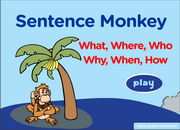
Question Words – What, where, Who, why, when, which, how, Grammar Activity
Practice Question Words – What, where, Who, why, when,...
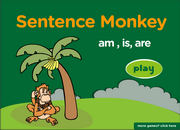
Verb – to be- Auxiliary Verb, am, is, are, ESL Grammar Activity
Practice the auxiliary ‘to be’ in the present simple...
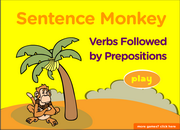
Verbs Followed by Prepositions, ESL Grammar Activity Online
Practice Verbs Followed by Prepositions, using this ESL Grammar...
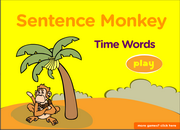
Learn words and expressions of time, ESL Grammar Activity
Learn words and expressions of time, (day, week, year, month,...
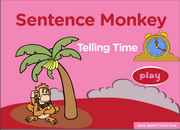
Time, Daily Routines Expressions, ESL Grammar Sentence Activity
Practice the Telling the time, using this ESL Grammar Interactive...
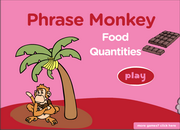
Food Partitives, Expressions of Quantity, a slice of, a piece of, ESL Grammar Activity
Practice Expressions of Quantity with this Food Partitives...
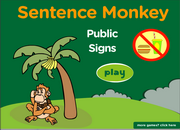
Public Signs, Imperative Form and Sentences ESL Grammar Activity Online
Practice the Imperative Forms and learn to talk about public...
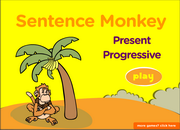
Present Progressive Tense Use, Continuous, ESL Grammar Fun Game Online
Practice the Present Progressive Tense, using this ESL Grammar...
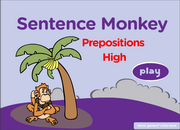
Prepositions Review ESL Grammar Activity Online
Review Prepositions, using this ESL Grammar Interactive Monkey...
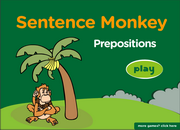
Prepositions of Place ESL Fun Game Online, Grammar Practice
Practice the Prepositions of Place, using this ESL Grammar Interactive...
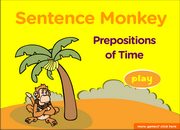
Prepositions of Time, ESL Grammar Interactive Game
Practice the Prepositions of Time, using this ESL Grammar Interactive...
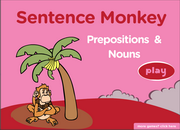
Prepositions Nouns Collocations, by hand, on foot, by chance, ESL Fun Game Online
Practice the Prepositions and Nouns Collocations, using this...
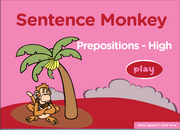
Prepositions,to,of, for, since, with, in, by, ESL Grammar Fun Activity
Practice the Prepositions, using this ESL Grammar Interactive...
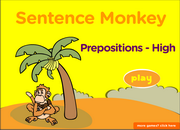
Prepositions, for, since, with, in, by, ESL Grammar Fun Game
Practice the Prepositions, using this ESL Grammar Interactive...
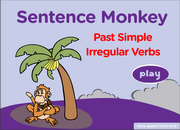
Past Simple, Irregular Verbs, ESL Grammar Interactive Activity Online
Practice the Past Simple Tense and Irregular Verbs, using this...
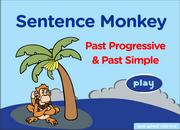
Past Progressive, Past Continuous, Past Simple, Verb Tenses, ESL Grammar Interactive Activity
Practice the Past Progressive or Past Continuous and Past Simple...
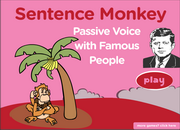
Passive Voice, Past Passive, ESL Grammar Sentence Activity Fun Game Online
Practice the Passive Voice Past Passive Famous People , using...
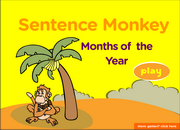
Months and Ordinal Numbers ESL Vocabulary Game Activity Online
Practice Months of the year and Ordinal Numbers with this ESL...

Modal Verb ‘Should’, ‘Shouldn’t’ for Giving Advice on Health Problems, ESL Grammar Activity
Practice Sentences with the modal verb ‘should‘ and...
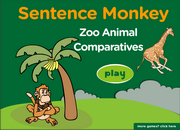
Comparatives, Superlatives, Wild, Zoo Animals Vocabulary, Grammar, Interactive Monkey Fun Activity
Review Comparatives and Superlatives with Vocabulary from Wild...
http://www.eslgamesplus.com/present-simple-tense-action-verbs-interactive-monkey-game/
There are images and in some cases audio in these types of games. Drag and drop the words into the correct spaces to complete the sentence. After that, click SUBMIT. If you are correct, the monkey will get a banana.
More Games

Question Words – What, where, Who, why, when, which, how, Grammar Activity
Practice Question Words – What, where, Who, why, when,...

Verb – to be- Auxiliary Verb, am, is, are, ESL Grammar Activity
Practice the auxiliary ‘to be’ in the present simple...

Verbs Followed by Prepositions, ESL Grammar Activity Online
Practice Verbs Followed by Prepositions, using this ESL Grammar...

Learn words and expressions of time, ESL Grammar Activity
Learn words and expressions of time, (day, week, year, month,...

Time, Daily Routines Expressions, ESL Grammar Sentence Activity
Practice the Telling the time, using this ESL Grammar Interactive...

Food Partitives, Expressions of Quantity, a slice of, a piece of, ESL Grammar Activity
Practice Expressions of Quantity with this Food Partitives...

Public Signs, Imperative Form and Sentences ESL Grammar Activity Online
Practice the Imperative Forms and learn to talk about public...

Present Progressive Tense Use, Continuous, ESL Grammar Fun Game Online
Practice the Present Progressive Tense, using this ESL Grammar...

Prepositions Review ESL Grammar Activity Online
Review Prepositions, using this ESL Grammar Interactive Monkey...

Prepositions of Place ESL Fun Game Online, Grammar Practice
Practice the Prepositions of Place, using this ESL Grammar Interactive...

Prepositions of Time, ESL Grammar Interactive Game
Practice the Prepositions of Time, using this ESL Grammar Interactive...

Prepositions Nouns Collocations, by hand, on foot, by chance, ESL Fun Game Online
Practice the Prepositions and Nouns Collocations, using this...

Prepositions,to,of, for, since, with, in, by, ESL Grammar Fun Activity
Practice the Prepositions, using this ESL Grammar Interactive...

Prepositions, for, since, with, in, by, ESL Grammar Fun Game
Practice the Prepositions, using this ESL Grammar Interactive...

Past Simple, Irregular Verbs, ESL Grammar Interactive Activity Online
Practice the Past Simple Tense and Irregular Verbs, using this...

Past Progressive, Past Continuous, Past Simple, Verb Tenses, ESL Grammar Interactive Activity
Practice the Past Progressive or Past Continuous and Past Simple...

Passive Voice, Past Passive, ESL Grammar Sentence Activity Fun Game Online
Practice the Passive Voice Past Passive Famous People , using...

Months and Ordinal Numbers ESL Vocabulary Game Activity Online
Practice Months of the year and Ordinal Numbers with this ESL...

Modal Verb ‘Should’, ‘Shouldn’t’ for Giving Advice on Health Problems, ESL Grammar Activity
Practice Sentences with the modal verb ‘should‘ and...

Comparatives, Superlatives, Wild, Zoo Animals Vocabulary, Grammar, Interactive Monkey Fun Activity
Review Comparatives and Superlatives with Vocabulary from Wild...
http://www.eslgamesplus.com/present-simple-tense-action-verbs-interactive-monkey-game/
Assinar:
Postagens (Atom)











